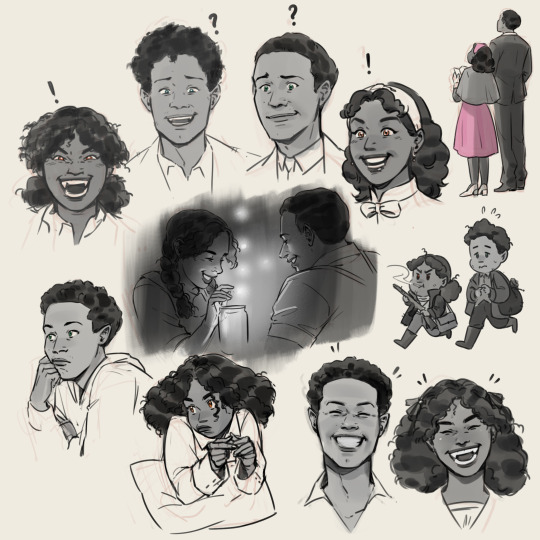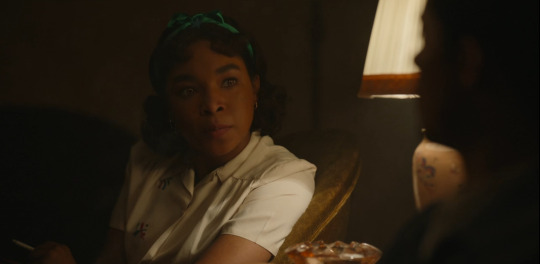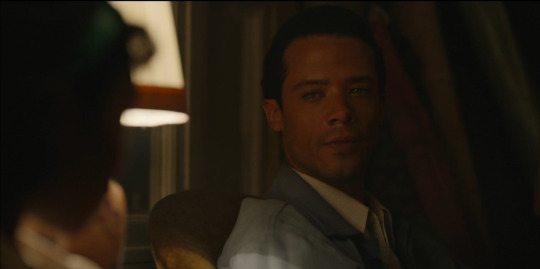Al. 28. Libra. She/her. sideblog for fandom stuff. not spoiler free. I follow from rainyyafternoons
Don't wanna be here? Send us removal request.
Note
When you were a child (so don't include anything uni/post-secondary related), did you ever go on any school trips that went outside of your country?
yes
no
nuance
results
#went to spain from the uk#but also i was in boarding school so school itself was like. a long field trip in another country lol
3K notes
·
View notes
Note
I hope it’s OK that I ask, how will your Loumand fic do the gaslighting stuffs ? Will there be a sad ending , or if it’s in a universe where Armand won’t do that so it has a happy ending !
Firstly, strictly in regards to the fanfic: we set out to write a fanfic that is earnest, optimistic, and invested in the importance of Louis and Armand's love for one another over the course of their long relationship. I don't know that I am able to categorize the ending, and overall tone, as sad or happy. It's a mixture.
Secondly, I don't want anyone to think it's not okay to ask stuff and I am thus choosing to assume the most good faith version of this question, where you really just want to know what's in store for the fic in regards to tone. However, I do want to say that waking up to this in my inbox bummed me out a lot. I think a friend put it well when I shared this and they agreed that it can read as "Will you address my specific headcanons in your fic? And if not, can I judge you for it?" There's a (probably unintended!) air of… policing how happy Louis/Armand fics are allowed to be and in what circumstances.
Thirdly, I'm going to hand it over to @marbleflan for a response to the idea of 'the gaslighting stuffs' being a necessary talking point to all Loumand fics:
Wow, ok buckle up yall this is gonna be long!
This is one of those asks that is just so hard to know where to begin. Let’s start with how Armand gaslighting is presented as an immutable fact of the show that we would have to rewrite or omit in order to write a story with a happy/optimistic ending. So first of all: what gaslighting?
Just as a reminder, gaslighting as a term comes from the film Gaslight and refers to subtle acts of denial of someone’s perceived reality in order to undermine their confidence in their own version of events. Crucially, gaslighting is a pattern of behavior, and relies on small acts of denial (in the film, the level of light thrown by the gas lamps, hence the title) that make possible larger assertions of one reality over another. So when and where exactly does Armand engage in this behavior? Point me to the places where this is happening because I haven’t seen it.
This kind of assertion that Armand is “gaslighting” or “manipulating” Louis is so pervasive in the fandom, to the point where it’s often presented as a fact of his character rather than one possible interpretation of his actions. My own interpretation is that Armand engages in a lot more self-deception than he does conscious manipulation: that is, when he lies to Louis, he really thinks he is justified by the circumstances, rather than misleading him for some ulterior purpose.
Armand lies to Louis canonically twice: 1) when he colludes with the cult to kidnap Louis and Claudia and put them on trial and 2) when he mischaracterizes his role in the trial as coerced and passive when in fact it was active. For me, the biggest factor in thinking Armand makes the choices he makes because he believes he has no other alternative is the delivery of the line “I could not have prevented it” about Claudia’s death. To me, this line is delivered not to Louis and not to Daniel, but to Armand himself—he’s reassuring himself that even if he made different choices the trial and its fallout were not preventable.
Given Armand’s backstory, this kind of makes sense. Although he is the most powerful vampire in the coven, his experiences have taught him that being the most powerful will not save you: his maker, after all, was even more powerful and ancient and was burned alive by the Children of Darkness. And Lestat’s disruption of Armand’s rule over the CoD likewise showed him that a persuasive and charismatic leader can overturn centuries of indoctrination. It isn’t that he literally couldn’t have prevented it—it’s that he believes he couldn’t prevent it.
The second lie, about the extent of his involvement, I think is really where there could be multiple interpretations. Why would he do this? My own take is that he does not go into the trial thinking Louis will survive. He fully expects that both Claudia and Louis will be killed and he’ll be left behind. Thus, he plays the role he always plays within the coven: artistic director. Later, after Lestat manages to intervene and transmute Louis’s sentence, he decides to free Louis. When Louis assumes Armand saved him at the trial, Armand doesn’t correct him and goes along with it, and the lie spirals from there.
To me, I can completely see Armand justifying these lies of omission in a variety of ways. Sure, he didn’t save him at the trial, but he did save him later (by freeing him from the coffin). Sure, he did betray him, but he thought he didn’t have a choice. What’s the difference between feeling like you don’t have a choice and being physically restrained? And so on, and so forth. My point is not that Armand is blameless, or that he should be absolved of responsibility for his choices, but rather to point out that his actions aren’t fundamentally manipulative. They’re in character for someone who has survived a lot of abuse and violence, and whose priority is their own continued survival.
Now let’s talk about the San Francisco episode. Louis recovers his memories and is shaken, upset, and resentful that Armand took them; Armand claims Louis requested he remove them. Is he lying? The show doesn’t actually tell us! It’s completely left up to the audience to decide! Despite the near ubiquity of the opinion that Armand is lying here, I think there’s plenty of reason to think Louis might have indeed asked Armand to wipe his memories.
Firstly, it’s weird that Armand would have chosen only this memory to wipe, but left Louis with so many unflattering memories of him completely intact. Why not erase the trial, or at least Armand’s betrayal? Armand, in Louis’s Paris memories, fights with him, fucks up in front of him, all sorts of things. If Armand’s goal is manipulating Louis (for what, I’m not even sure - just to stay in a relationship with him?) why erase only this one memory? And moreover, why not erase Daniel altogether? Daniel stays with Louis and Armand for five days and then Armand says he erased Louis’s memories three days after that. Armand can erase eight days of memory but not eight and a half?
Secondly, although Daniel makes a huge deal out of their memories cutting off at the same moment, to me this is more of a flag for the opposite. In Louis’s own recovered memories, he is an active participant in erasing Daniel’s memory: in fact, it is practically his idea! Armand is ready to drain Daniel, wrap him in plastic, and yeet him into the nearest incinerator, and Louis is the one who demands he live. Louis is the one seen feeding Daniel his rote lines. Louis’s own rote lines, which emphasize Daniel’s importance, make more sense for him to have authored than Armand, who at that point is pretty much ready to kill Daniel and be done with it.
I also think it’s in character for Louis to have asked for it. Louis, in season one in the confession scene, says explicitly that his problem is avoidance: he runs to the bottle, etc. In fact that’s exactly what we see him doing in 1973, escapism via drugs and sex. Louis’s desire for the truth but instinct to misremember is central to his whole character. Hence the emotional freight of him telling Daniel that Lestat’s version of Claudia’s turning was more accurate, it’s him confronting how even as he tried to reveal the truth to Daniel his instinct was to alter the details to make himself seem less culpable. He’s always struggling with this: how much of what happened is his fault? He’s afraid of the answer, because he feels responsible for it. Additionally, Louis has trauma specifically around suicide, because of Paul’s death. So yeah; I can see him at a low point in 1973 saying “I can’t live with myself, I don’t want to remember this.”
This is just my interpretation, but it’s as valid as any other, because the show does not give us the answer.
This is getting way too long and I have more to say BUT finally I’ll just ask that if you’re jumping on the “Armand is manipulating Louis” bandwagon please sit with yourself for a moment over why it’s that character that must be the manipulator. Why, in a show that takes great pains to have a full cast of flawed, realistic, imperfect characters, the one that is somehow irretrievably, Machiavellian-ly manipulative? What is it about him that inspires this reaction? 🧐🧐🧐🧐🧐 Maybe just sit with that question for a minute.
-
THANK YOU @marbleflan for all that. I'm going to be honest: I don't really have the emotional energy for further discussion of this, which is why I'm grateful my friend was willing to share her thoughts. If you disagree with this, that's your prerogative! But I'm not going to be answering any asks that seem to be judging/policing/starting drama over a wrong interpretation of the character or ship.
#ash with the bangers as always#go best friend!!!!#the abuse apologia in this fandom is wild bc how#have we reached the point of ‘why would he manipulate him? just to be with him? checkmate!’#like…yeah? irl abusers be abusing their romantic partners yall#whatever reason you think that happens apply that to loumand#they do it for control they do it bc they’re scared of being alone they do it to leech off the radiance of their partner#it’s not that hard to figure out#if you could understand loustat as abusive in s1 you really should be able to understand loumand as abusive in s2#and if you can’t well. that’s just the apologism blinding you babes#iwtv
159 notes
·
View notes
Text

1K notes
·
View notes
Photo




zuko and katara saving each other
17K notes
·
View notes
Text


INTERVIEW WITH THE VAMPIRE 1.01 | "In throes of increasing wonder"
2K notes
·
View notes
Text






Interview with the Vampire | 2.04 "I Want You More Than Anything in the World"
#louis (jacob) almost smiling makes my heart race#why’d he eat the picture louis why do you imagine lestat eating the picture#did he do dumb shit like that to amuse and distract you whenever you were upset about something#well he did do dumb shit like acting out nosferatu to make them laugh#and he did get all cutesy to cheer louis up about almost eating his nephew#so maybe eating paper to make louis laugh and cheer him up is not farfetched#…..weh#otp: be all the beautiful things you are#iwtv
1K notes
·
View notes
Text

A haunting lullaby
4K notes
·
View notes
Text



ASSAD ZAMAN as Armand
INTERVIEW WITH THE VAMPIRE (2024) 2.08 – And That's The End of It. There's Nothing Else.
#actually diabolical#that smirk#what louis said: you’ll never make it up to me#what armand heard: i get to spend forever at your side ‘trying’#im sick#louis girl watch out there’s a demon behind you!!!#armand#iwtv
694 notes
·
View notes
Text












Louis & Claudia Interview with the Vampire | Season 2
3K notes
·
View notes
Text


That's your problem, Louis, always has been. You're arrogant. "Everyone's fawning over Picasso, but not me, not Louis du Lac."
#as she should be 🥰#arrogant haughty all of the above#beautiful black women deserve to be#what’s it they called tyla again?#uppity african that’s me and my good sis louis#ldpdl#iwtv
9K notes
·
View notes
Text
after s1 and before s2 you had every lestat stan on earth insisting —based on nothing but racism and abuse apologia— that armand would be shown to have implanted false memories of lestat's abuse in louis's mind and even to have been fully puppeteering louis for the past 8 decades and that this twist would reveal he was the real villain all along and lestat the romantic hero. despite being proven wrong over and over —as indeed nothing in armand's abuse of louis absolved lestat of his, the second season only reinforced the abusive nature of lestat's behavior in the first, and armand's psychological abuse was never shown to extend to actual extended mind control— those idiots have not disappeared, and they have now been joined by every armand stan on earth insisting —based on nothing but racism and abuse apologia— that armand is either an innocent victim of circumstance or, worse, the one actually being abused by louis. that a lot of the second subset of people were originally arguing against the first subset is maybe the most appalling part of this turn of events, and it's baffling to see a lot of the same rhetoric that was used to justify and excuse lestat now be used about armand. it feels like these critiques were not the result of a principled stance against abuse but simply "fan war" type arguments fueled primarily by like or dislike of a character or ship, and there are no actual qualms against peddling abuse apologia, just against having one's favorite character (accurately) characterized as an abuser. and this refusal to acknowledge that someone (in this case a character, most often real people) one likes could be abusive is symptomatic of the same pervasive abuse culture that the show itself prompts us to criticize with episodes like 1x6 and 2x7. this post isn't going anywhere, except maybe to the conclusion that my hopeful outlook on fandom's potential might be misguided and that trying to engage thoughtfully with a story about abuse in fan spaces is likely a fucking lost cause.
#well yes!#the lestans and armandcels are such a huge proportion of the fandom as well like jesus#the number of ‘aw poor lestat’ and ‘i feel so bad for armand’#bitch i dont!!!!!#don’t care how sad and desperate for love you are don’t be fucking abusive dickheads??#louis being mean to yis sometimes bc it’s the only way he feels he can exercise a modicum of control is not actually#him being ‘the real abuser’#dpmo#iwtv
113 notes
·
View notes
Text



Margarita Karapanou, tr. by Karen Emmerich, from Rien ne va plus
#WEHHHH#ohhhhh louclaudia my beautiful tragic louclaudia#you loved each other so much. so much#im so sorry#louclaudia#cdldpdl#ldpdl#iwtv#duo: as long as you walk the earth
4K notes
·
View notes
Text
ok, let's be serious for a second:
how could louis's refusal to acknowledge that lestat is some kind of supernatural being in 1x1 become less clear upon rewatch?
what are you looking at exactly that you completely miss paul having hallucinations and living with the threat of institutionalization, or somehow fail to connect this with louis's own willful blindness to his own perception of impossible and irrational things?
nevermind that hypnosis and mesmerism were still all the rage in those days, nevermind all the later evidence that louis does suffer from hallucinations as symptoms of some kind of mental illness. just looking at the pilot, at louis's defensiveness and concern over paul, at louis's own confession to the priest that he is suicidal and thinks himself corrupted by the devil, is it not self-evident?
the du lacs clearly had a genuine religious belief in god and the devil, mental illness has always been strongly tied to demonic possession in the catholic imaginary, just like homosexuality, which was already being pathologized at this point. it's all a perfect loop and it ties neatly into the vampirism/queerness/disability allegorical thread: louis, in denial about his desires, in denial about the possibility that he could be "crazy" like paul. turns out that nobody informed him that he was in a vampire romance, so louis had absolutely no reason to jump straight to "this guy i'm kind of crushing on is actually an undead creature of the night" instead of "this is evidence that my unholy deviant inclinations are just one aspect of a more general wrongness that would brand me unfit for polite society if it were revealed, just as it happened to my brother, who was forcibly institutionalized until not long ago".
like, sorry for being an annoying killjoy who hates fun, but i keep seeing different versions of the same take/joke/question and it just frustrates me more every time, especially because 99% of the time it seems to play into the even stupider "louis is incurious/simple-minded/dumb" take which just grates on my fucking nerves.
#no pls i know bc like#even the haha louis is just freaky he was too turned on by lestat’s weirdness to question the tricks!#kinda really upsets me lol#bc. well no.#he just wasn’t sure if they were like. REAL real and didn’t wanna investigate too deep bc damn what if im actually just losing it#but also. he liked lestat he felt more seen and more understood and more able to confide in someone than he had ever felt in his life#and didn’t want to give that up#pls#ldpdl#iwtv
347 notes
·
View notes
Text
louis may (and does) desire armand in paris but that's not the point; he has to barter w armand's desire for him to keep at bay the threat of his secret being revealed. his and more importantly (to him) claudia's lives are in danger bc of what he's disclosed to armand, what armand pried from him, and any foundations of an artless relationship are crushed by that obligatory anvil. like louis' enjoyment of armand's company or the sex is rendered irrelevant by its unquestionable necessity due to his power over louis that armand will not hesitate to weaponize....
#no exactly! exactly#like maybe under other circumstances things could’ve been different#maybe it would’ve been a short lived rebound that fizzled away eventually#maybe it would’ve been a slow growing journey to real love and companionship#but none of that matters#the point is rendered moot by the reality that louis was fighting for his and his daughter’s life#armand pressured him into admitting the lestat secret of it all and then turns around and wields it#uses it as he sees fit#to manipulate louis to threaten claudia#this colours their relationship from the very beginning#iwtv
111 notes
·
View notes
Text
the issue with a lot of those who call themselves lesdaughter fans is evident in the chosen portmanteau. it’s so entirely about lestat and lestat’s personhood rather than being equally about lestat and claudia. claudia, rather than having her own viewpoint and inferiority, is positioned solely in relation to how she belongs to lestat, to her relationship to lestat, rather than their relationship with each other. it becomes about validating lestat’s love for her at the expense of claudia’s feelings and the extent of the abuse he put claudia through. that’s how the idea that lestat only made her watch charlie burn out of tough love and bc he loved her /too/ much becomes a fanon that’s taken for granted, rather than what’s shown on screen, which is that whatever inner feelings or guilt or shame he has after the fact doesn’t change that he chose to make his daughter miserable and that he used his position as the most materially powerful person both within and outside of their home to abuse her, and so focusing on how tough it must’ve been for him to abuse his child is abuse apologia and at best, demonstrates a lack of understanding how power and abuse work.
of course he had feelings about it; bad parents are still people. but not every bad parent tried their hardest/best and just happened to fall short. some parents just suck, and culturally this is often (not only, but often) the father, the patriarch, who takes his position as godhead of the family to act with impunity not in his children’s best interests, and sometimes not even in his best interests, but in whatever demonstrates how absolute his power is. it’s ridiculous to claim that lestat just wanted to toughen claudia up out of love so that she’d navigate a tough life better when he went berserk at the possibility of louis committing suicide and murdered two priests (important figures in the community, something he later scolds louis for), or when the possibility of louis leaving—not even dying, but just leaving!—sends him into a violent abusive rage. but we’re meant to believe that he forced her to watch charlie’s body disintegrate out of love? why is his grief more important than hers?
it is both possible that lestat loved claudia and that he was unbelievably cruel to her. that he loved her and grieved her does not soften his cruelty when she was alive, when she trusted him, when she also loved him and he took advantage of that love to prey on her biggest vulnerability (which is also his biggest vulnerability, curious enough), mock her traumas (that he also had! so it’s not as if he didn’t understand how cruel it was), and then he doesn’t apologize to her during the trial and he saves louis only (even though he’s still fucked up about how his parents treated him centuries later). whatever one might think of what he would’ve done if he could’ve or his regret after the fact, all claudia knew when she was alive is that her father, the person she once thought understood her best, treated her like scum, made her feel like a slave, entrapped her in misery so potent that she had to kill him to escape, and then he stands there and watches her die. the reason why his grief is so potent and unmanageable for him for all those decades is precisely because he knows how absolutely he failed her. lestat didn’t spend the past century being gaslit and having his memories removed, he remembered every moment that he did the worst possible thing he could’ve done, and that no matter how sad it makes him, no matter how much he cries after the fact, he failed her. when you center claudia’s life instead of treating her like a foregone ghost, instead of acting as if she only existed in order for lestat to later mourn her and for lestat to grow from it, that’s when analyzing their relationship becomes full and rich. it’s not just that lestat sees claudia look at him at the end, but that claudia turns to him at the end—at the very last moment, she was a subjective person despite how external factors tried to refuse her subjectivity—her and lestat are two sides of the same coin, both in resilience and willpower and strength; the only difference is that she was a Black woman in a teen girl’s body and he was a white man, and so society punished her for what it rewarded him. when we do the same, define her solely in relation to the white father who failed her and was given the chances she wasn’t, it is another sort of murder I think. sure the tragedy is there was love, but for lestat, that tragedy was self inflicted. if it’s true that he warned that she would suffer, all that really tells us is that he made sure of it. like most fathers
#im going to marry this post#this is EXACTLY it#lesdaughter this lesdaughter that#when claudia wanted NOTHING to do with that man#hoping in your last moment alive that maybe for once your father will do right by you does not excuse the years of abuse endured from him#yes they had good moments in the early years#yes they are similar in many ways#yes some of her behaviours are adopted from him#none of this changes the fact that he abused her!#and that SHE never forgave him for it!#iwtv#cdldpdl#ldl
445 notes
·
View notes
Text


It’s the soprano Sofia Consoli’s American debut, her fifth stop in a 22-city tour, so the orchestra should be in excellent form. I have a private box, and I had tuxedos made.
#louis!!!!!!!#god he likes that man so much#he really can’t stay mad at him#lestat is truly the luckiest bitch in the world#otp: be all the beautiful things you are#iwtv
9K notes
·
View notes
Text





Louis, the gentle one, with the black hair and green eyes, whose steps made a careless sound when he walked, who even whistled to himself in dark streets so that mortals heard him coming. QUEEN OF THE DAMNED, pub. 1988
3K notes
·
View notes